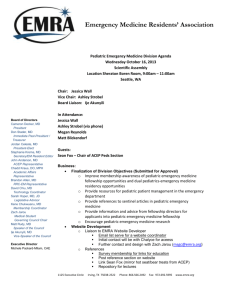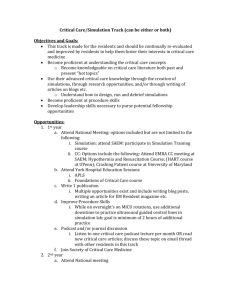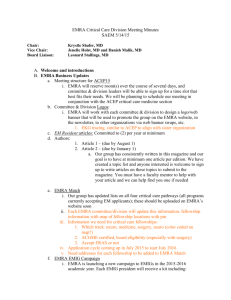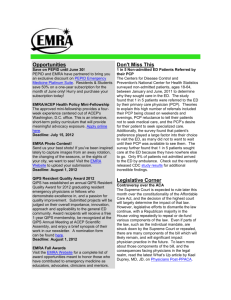a letter in support of your candidacy
advertisement
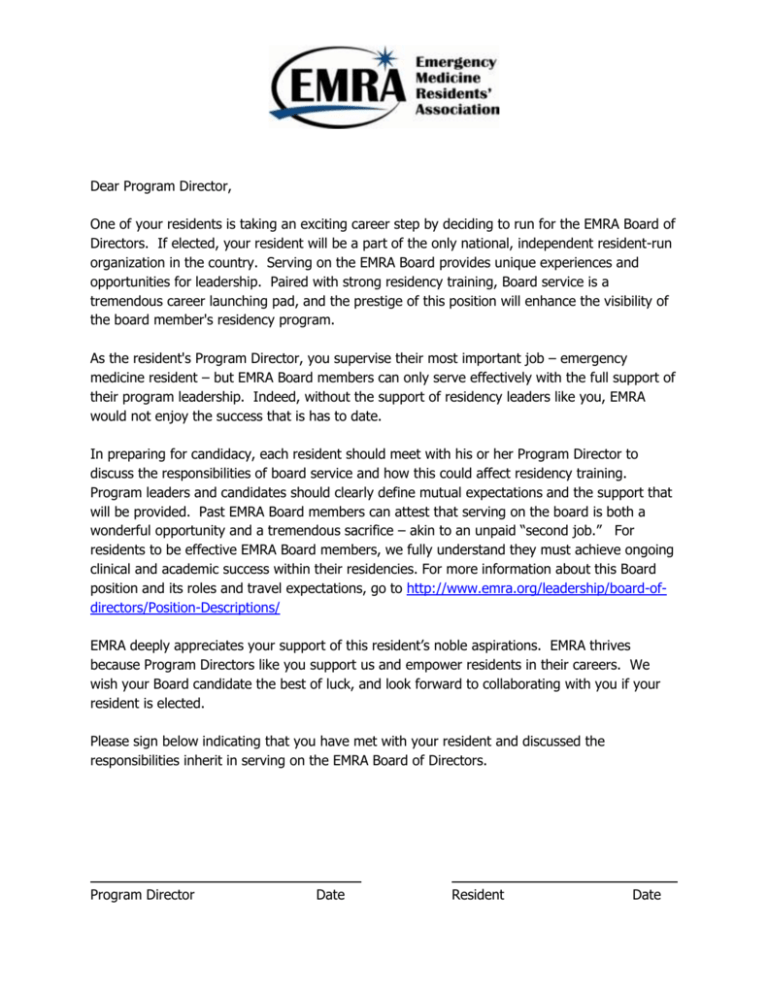
Dear Program Director, One of your residents is taking an exciting career step by deciding to run for the EMRA Board of Directors. If elected, your resident will be a part of the only national, independent resident-run organization in the country. Serving on the EMRA Board provides unique experiences and opportunities for leadership. Paired with strong residency training, Board service is a tremendous career launching pad, and the prestige of this position will enhance the visibility of the board member's residency program. As the resident's Program Director, you supervise their most important job – emergency medicine resident – but EMRA Board members can only serve effectively with the full support of their program leadership. Indeed, without the support of residency leaders like you, EMRA would not enjoy the success that is has to date. In preparing for candidacy, each resident should meet with his or her Program Director to discuss the responsibilities of board service and how this could affect residency training. Program leaders and candidates should clearly define mutual expectations and the support that will be provided. Past EMRA Board members can attest that serving on the board is both a wonderful opportunity and a tremendous sacrifice – akin to an unpaid “second job.” For residents to be effective EMRA Board members, we fully understand they must achieve ongoing clinical and academic success within their residencies. For more information about this Board position and its roles and travel expectations, go to http://www.emra.org/leadership/board-ofdirectors/Position-Descriptions/ EMRA deeply appreciates your support of this resident’s noble aspirations. EMRA thrives because Program Directors like you support us and empower residents in their careers. We wish your Board candidate the best of luck, and look forward to collaborating with you if your resident is elected. Please sign below indicating that you have met with your resident and discussed the responsibilities inherit in serving on the EMRA Board of Directors. Program Director Date Resident Date Program Support Financial Considerations EMRA pays the expenses for Board Directors throughout their tenures (including transportation, meals, lodging, conference registrations and select incidental expenses). Cost of travel for candidates to the conference at which they are elected is not funded by EMRA; the candidate’s program should provide financial support for this expense. Elections Process All candidates must be residents at the time of their election. Elections take place during the EMRA Representative Council meeting at ACEP’s Scientific Assembly. The Council meeting begins with a breakfast, during which candidates meet and engage with Program Representatives. Candidates are allowed to distribute brief handouts. Candidates are also allowed to address the EMRA Medical Student Council during their meeting, and can arrange a visit with the MSC Chair. Each candidate delivers a three-minute speech and then answers a position-specific question in a two-minute time frame. Campaigning outside of the events above is prohibited. It is strongly encouraged that all candidates and their programs refer to EMRA’s official Election Policy. Time Commitment All offices are two year terms, with the exception of the presidency. o The presidency is comprised of three years -- President-Elect, President, & Immediate Past President. Board members spend a considerable time working on EMRA projects, including 70+ hours per week during annual conferences, and often 5-20 hours per week during the rest of the year. Schedule Considerations All members of the Board of Directors are expected to attend four annual meetings: o ACEP Scientific Assembly (Fall) o EMRA Board Retreat (Winter) o ACEP Leadership and Advocacy Conference (Spring) o SAEM Annual Meeting (Spring) All members of the Board of Directors are expected to participate in conference calls as necessary. Calls are typically monthly and last two hours. Program Directors and EMRA Board Members are encouraged to discuss work-life balance during the resident's tenure to ensure that the resident has adequate personal time for wellness, including adequate time for rest and recovery from both residency and Board activities. Additional meetings may also be required, depending on Board position. These included but are not limited to: o ACEP Representative – attends ACEP Board meetings and Board Retreats o Academic Affairs Representative – attends CORD meetings o Speaker and Vice-Speaker – attend AMA meetings and ACEP Steering Committee meetings o Presidents – attend ACEP Board Retreat, and it is highly encouraged they attend EDPMA, CORD, and ACEP/EMF Corporate Council o Past President – attends ACEP Finance Committee meetings - A full list of meeting requirements by position can be found on www.emra.org Core Competencies Board service develops many of the non-clinical skills referenced in the Model of EM/Core Competencies and the EM Milestones, including Professionalism, Systems-Based Practice and Interpersonal Skills. More specifically, Board Directors develop skills and experience in communications, negotiation, education, patient and professional advocacy, leadership, management, regulatory and legal aspects of EM, evolving trends in healthcare delivery, and regionalization of emergency care. Academic Credit for Service In acknowledgment of the professional development that Board Members experience related to their board service, many programs have chosen to provide some form of academic credit. This may involve elective credit (Administration/Leadership), identification of EMRA projects as scholarly projects, and providing shift reductions (as many programs provide for their chief residents). Scheduling can be a challenge for residents in these roles. Programs often place higher priority on schedule requests for leadership responsibilities, allowing board members to modify their block schedules so that travel obligations can occur during months where such requests can be efficiently accommodated.
